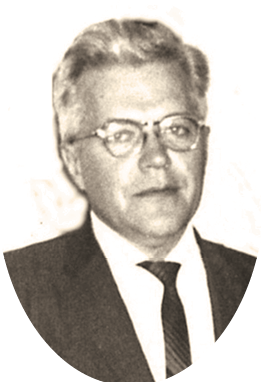In this series we are reprinting Spokesman articles by early leaders in the CLC. Pastor James Albrecht is the curator of the series. Rev. Carl M. Thurow (1914-1999) was a leader in the formation of the CLC. He held pastorates in Two Rivers, Wisconsin; Lamar, Colorado; and Fridley and Austin, Minnesota, as well as serving on the CLC Board of Missions. This article is from the Lutheran Spokesman of May 1962. Scripture quotations are from the King James Version.
Our Easter Hallelujahs have been sung and we are about to observe our Savior’s ascension to His heavenly throne. He is no longer with us visibly, but He has not left His Church comfortless. Ten days later, on Pentecost, He sent the Holy Spirit to the faithful at Jerusalem. Peter’s great Pentecost sermon in Acts 2 brings three thousand to faith. The “man lame from his mother’s womb” (Acts 3:2) is healed. A crowd gathers and Peter preaches again. Then the persecution begins. One Bible summarizes Acts 4 like this: “Peter and John imprisoned. Peter boldly proclaims the lame man to have been healed by the name of Jesus. They are commanded to preach Jesus no more. Threatenings are added, whereupon the Church fleeth to prayer.” The famous St. Paul Oratorio begins with this prayer of the early Church, after which the believers sing: “All glory be to God on High. . . . To us no harm shall now come nigh.” (TLH 237) The same enemies who killed the Savior were out to destroy His Church. A dark picture indeed. But faith turned to prayer and found strength in the Word. No real harm could come to them.
Stephen enters the scene: false witnesses, the trial, his great sermon in Acts 7, the stoning, “I see the heavens opened,” Jesus sadly and tenderly singing “O Jerusalem, Jerusalem, thou that killest the prophets” (Matthew 23:37) . . . “Lord, lay not this sin to their charge” (Acts 7:60) . . . Stephen falls asleep. The funeral hymn is based on Paul’s “For me to live is Christ, and to die is gain,” (Philippians 1:21) and it is sung to the tune of “If Thou But Suffer God to Guide Thee.” (TLH 518) A more comforting funeral hymn is not to be found. The drama builds up. “To us no harm. . . . ” No? Stephen is dead, and Saul who guarded the clothes of these murderers is threatening and slaughtering the believers. Saul sings phrases from several Psalms: “Consume them all. Lord Sabaoth, these thine enemies!” With such words the composer shows us Saul’s self-righteous soul. As this proud Pharisee makes ready to journey to Damascus for more slaughterings, he piously prays God to help him kill the Christians there. But a chorus comforts us with the reminder that “the Lord is mindful of His own.” There comes the light from heaven and the voice: “Saul, Saul, why persecutest thou me?” (Acts 9:4)
Yes, the Lord is mindful. Saul who hoped to destroy the Church will now become its greatest preacher, bringing the Gospel to the Gentile world. A mighty chorus explains the prophecy from Isaiah 60, “Arise, shine: for thy light is come,” following it with the first stanza of “Wake, Awake.” (TLH 609)
Meanwhile the Lord Jesus has made Saul into Paul. The about-face is breathtaking. He sings: “Have mercy upon me, O God,” and many other words from David’s Psalm 51. The proud scoffer is now a humble believer!
This St. Paul Oratorio uses Scripture to teach us a comforting lesson. All appearances to the contrary, our Savior does rule, build, and protect His Church by the Holy Spirit working through the Word. Only an all-powerful God could perform this miracle of enlarging His Church by changing the Pharisee of Pharisees into the preacher of preachers.
But just who put this story to music? That is another miracle. The Lord caused a famous Jewish philosopher to trust in Christ’s redemption. And thus it was that the Holy Spirit led that man’s grandson, our great composer Felix Mendelssohn, to be baptized and raised a Lutheran. Mendelssohn’s intense faith grips you in this music. You will even wonder if he felt a special love for the story of Paul because he saw in it so much of his own story—graciously snatched from Judaism and given the crown of life. And as the Holy Spirit saved thousands through the testimony of Paul’s preaching, so He has surely brought many to faith through the preaching of Mendelssohn’s oratorio. “God works in a mysterious way His wonders to perform.”

1914-1999

